Careers in Chemical Engineering: Caroline Metcalf

Yasmin Ali interviews Caroline Metcalf about her journey from aluminium smelters to railway stations
I’m a chemical engineer working in the energy sector. I was originally attracted to study chemical engineering because of the breadth of career opportunities it provides. To showcase this diversity, I will be talking to a range of fellow chemical engineers to find out what they do, how they got there, and why they do it.
For this instalment, I spoke to Caroline Metcalf, Project Manager at Bechtel for the UK’s rail sector.
After spending 25 out of the last 30 years abroad, Caroline is enjoying the novelty of being back in the UK, project managing the construction of a UK rail station.
This is Caroline’s first foray into the rail industry, having spent much of her career on the construction of aluminium smelters. Starting off as a process engineer at Bechtel, she worked on the designs of an aluminium smelter before joining the construction team to gain site experience.

“Once you’ve done one smelter, you get drawn into the industry,” Caroline explained.
The production of aluminium by electrolysis requires carbon anodes, which get consumed in the process. A carbon plant is usually built on site to make replacements, and this is one of Caroline’s areas of expertise. In addition to a number of smelters throughout the Middle East, Caroline has worked in oil and gas and power plant construction.
“I also did a semi-automated port in the Middle East, it was a lot of landfill reclamation and delivering the topsides – cranes, buildings, everything you need to run a port.”
Understanding people
These experiences took Caroline from putting a package together and winning a project, to testing and commissioning and handing over to the operator. Working overseas with different cultures has been an enriching experience for her. As a project manager, her challenge is to understand these cultures, and what it takes to make everyone work together.
“Getting to know people, everyone on site, and finding out what their issues are means they then feel free to talk to you when you’re walking around. It’s great if they come to you with problems. You don’t want to be out of touch and out of reach.” This seems to be vital for the success of a project.
Caroline spent a couple of years working as an underwriter in the re-insurance industry, using her experience to make a judgment on project construction risk. Working at a higher level with the banks and project investors provided a fascinating window onto all types of projects taking place across the world, but Caroline returned to project management.
Project management
“I was tempted back into construction, you’re rather helpless when you do see projects running into difficulty. All you can do is write a report recommending measures to take.”
The chemical engineering degree, combined with years of experience has equipped Caroline with a feel for what’s right and wrong. Fire mains are a necessity of any rail station, installing and testing their pressure is a good example of this.
“Because you’ve done all that time and again, you can see when a number looks right or if a calculation has been done properly. Chemical engineering is a lot about a common-sense approach and thinking things through logically.”
Moving around for work and living abroad meant making new social groups. Activities like sailing and running enabled Caroline to get to know people, as well as explore the terrain. Since returning to London, sailing has taken a back seat, but she and her husband now have dogs, an excuse to explore their new surroundings.
For more articles in this series, visit https://bit.ly/2DZmjA4
Recent Editions
Catch up on the latest news, views and jobs from The Chemical Engineer. Below are the four latest issues. View a wider selection of the archive from within the Magazine section of this site.




